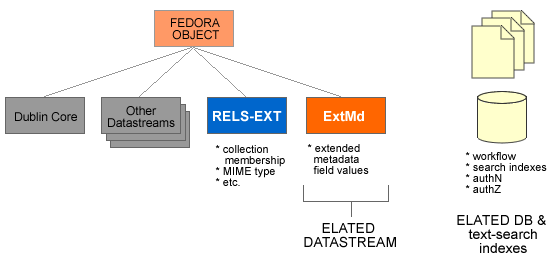

Elated is a lightweight, general-purpose application for managing digital files. ELATED is built on top of the Fedora Repository System, and could be used as a digital assets management system, an institutional repository, or to meet other collection archiving, publishing and earching needs.
Elated's goals are:
Elated was developed at the ACS Technology Center. The development of the initial 1.0 code was done by participants in the 2004 ACS Software Engineering Internship. For more information, see the Credits.
Elated attempts to distinguish between 2 types of data: data of archival interest, and all other types of data. The former it stores in Fedora; the latter it stores in its own custom database. The following chart shows how this division plays out in the software:
| Archival / stored in Fedora | Other / stored locally |
|---|---|
|
digital object files digital object metadata collection metadata collection membership info |
ELATED authorization information ELATED authentication information local preferences, etc. |
One important goal of this division is to allow Elated to serve as a tool for institutions that want to transition to Fedora but do not have the resources to develop custom Fedora disseminators. Elated stores its data in a manner that will allow that data to be available to future generations of tools and applications for Fedora.
Many of these technologies were selected to make the ELATED back-end services match those required to run Fedora. Please check out the high-level architecture diagram for additional details about the layering and organization of components.
ELATED stores digital files in the Fedora repository as Fedora objects. Compound objects in ELATED are Fedora objects with multiple Fedora datastreams. Dublin Core metadata entered in ELATED is stored in the Fedora object 'DC' datastream.
In addition to these datastreams, each Fedora object referenced in ELATED may contain an additional XML-based (type 'M') datastream: ExtMetaData.

This file is designed to store extended metadata beyond the Dublin Core, so that future applications may access this data and work with ELATED collections. (A preferable way to handle this data might be to make assertions in RDF according to a defined ontology in the RELS-EXT datastream, but that is currently not supported by Fedora.)
The Elated source code is released under the GPL: http://www.gnu.org/copyleft/gpl.html
Elated references many 3rd party libraries whose licenses are not GPL, but whose orientation is open-source. Implementors will need to evaluate licenses that cover those libraries. Those libraries include: